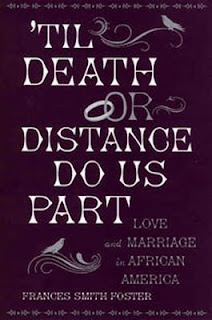Emory University English and women's studies professor Frances Smith Foster challenges deeply ingrained theories about slave marriages and the impact they have had on modern African American marital stability in her new book, "‘Till Death or Distance Do Us Part: Love and Marriage in African America" (Oxford University Press, 2010).
Foster's evidence is letters, poems, sermons, essays, court cases and articles written by slaves during or after their enslavement, and by antebellum African Americans who were free. The documents show that even though enslaved people could not legally marry, many did so anyway for life - and even beyond.
The book is a product of the Center for the Study of Law and Religion's (CSLR) project on "Sex, Marriage, and Family & the Religions of the Book" and is a companion to Foster's earlier CSLR volume, "Love and Marriage in Early African America" (Northeastern University Press, 2007).
Foster, who earlier this month received the Association of Departments of English "Francis Andrew March Award" for exceptional service to the profession of English, will discuss her new book at 7:15 p.m. Monday, Feb. 1, at the Decatur Library, 215 Sycamore Street, Decatur, Georgia 30030.
Foster, an editor of "The Concise Oxford Companion to African American Literature" and "The Norton Anthology of African American Literature," and the author of a dozen other volumes, writes in "‘Till Death or Distance" that many modern African Americans buy into the misconception that they cannot commit and are ultimately doomed to failure in relationships with the opposite sex, the men are incarcerated, and the women are "demanding, emasculating or traumatized," all because black Americans do not have a heritage of marital success as do white Americans.
Foster refutes these claims, saying that slaves usually celebrated their marriages with their families and friends. Some even were able to have lavish weddings, marrying in churches and exchanging rings. Because many African Americans believed in staying faithful to their spouses until death, they chose their partners carefully. When free African Americans fell in love with people who were enslaved, it was not uncommon for them to forfeit their freedom so that they could marry their beloved and live together. They viewed "freedom a dubious gift, a counterfeit coin, if they couldn't spend it on the people they loved."
She also points out that slave owners used this dedication to their advantage. They tried to force slaves to marry each other to decrease the probability that they would run away. Slaves who believed that this was true refused to marry, especially if they could not marry the one they loved. Those slaves who did marry and run away sometimes came back for their spouses and children, even though they risked getting caught. What's more, physical distance between slaves often had little effect on their decisions to marry, even though they risked whips, lashes and even death to visit each other.
After the Civil War, evidence of the dedication between husband and wife includes "Information Wanted" columns in newspapers for and by African Americans, seeking information about their spouses. Even when they had not seen each other for 40 years, spouses still sought desperately and did not remarry.
Foster hopes that as a result of this book, African Americans will rethink what the legacy of slavery means for them individually and collectively. "The half-truths about marriage among slaves has devastated and embarrassed the African American community long enough," she says. "When people internalize the disrespect and believe that they are, indeed, as their oppressors define them, they cannot aspire to greatness."
About the Center for the Study of Law and Religion
The Center for the Study of Law and Religion (CSLR) at Emory University is home to world-class scholars and forums on the religious foundations of law, politics, and society. It offers first-rank expertise on how the teachings and practices of Christianity, Judaism, and Islam have shaped and can continue to transform the fundamental ideas and institutions of our public and private lives. The scholarship of CSLR faculty provides the latest perspectives, while its conferences and public forums foster reasoned and robust public debate. ###
Contact:
- April Bogle: 404.712.8713
- Beverly Clark: 404.712.8780
















No comments:
Post a Comment